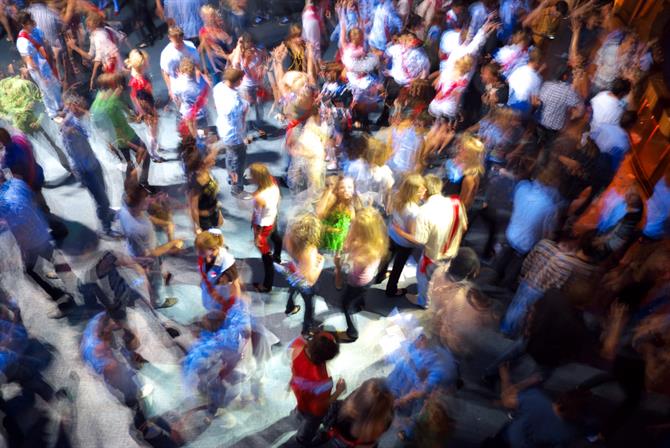
Before we elaborate on this, I also wanted to focus on the definition of ‘low-cost tourism’. According to several recent articles in the Spanish press, low-cost tourism is directly associated with tourists who drink too much and disrupt local neighbourhoods with their drunken behaviour. Actually low-cost tourism has nothing to do with drunk tourists. Low-cost, or ‘recession tourism’, was defined in 2007 as being a travel trend that offered a low-cost, but high value experience, in destinations where the lower cost of living, meant a traveller’s money would go further.
Just because a tourist seeks a ‘low-cost’ holiday, it doesn't mean they are also looking to play havoc on the destination. These recent articles have used examples of shenanigans in the Spanish cities of Seville, Valencia and Barcelona. Hardly cities you would associate as ‘low-cost’ destinations.
So let’s say, ‘low-cost tourism’ is not ‘booze tourism’. But booze tourism is a big problem for many resorts. How does a destination develop its ‘booze or party’ label? It definitely isn’t created by holiday rentals and tourist apartments offering low-cost accommodation. A more reasonable suggestion is that it has been created by its reputation as a party destination, its popularity with the 18-30 age group and its tolerance to the businesses that bring in tourists looking for an indulgent party vibe. It doesn’t need to spend any of its marketing budget on attracting this traveller profile, its reputation is all the marketing it needs.
Take ‘Marbs’ for example. Marketed as a luxury brand by its tourism department and indeed, my home town of Marbella has so many wonderful qualities. But its luxury tag, coupled with a hedonistic party reputation, also attracts pleasure-seeking tourists who tarnish the luxury resort with their drunken antics.
Now cities like Barcelona and Valencia are claiming booze tourism is on the increase, due to illegal city lets springing up in the city centre. Of course new accommodation is springing up to cater for an increased influx of tourists, but this new accommodation hasn't caused the influx of tourists.
High volume resorts have always been catered for by low-cost, all-inclusive hotel packages. As one homeowner from Ibiza pointed out, “Since the 60s, inexperienced hoteliers placed themselves in the hands of tour operators offering mass tourism at low prices.” And here the problem is born. Not just in Ibiza, it’s at the core of the problem for resorts and destinations throughout Spain. Surely it’s logical that a destination’s reputation, coupled with low-cost hotel packages - robustly marketed by tour operators - are the real reason a destination attracts a higher volume of drunken tourists?
To corroborate the case of Barcelona I did a bit of research online. Searching for the best destinations to party in the world. Barcelona appeared in various lists as one of the ‘Best places to party in Europe’ and ‘Top Party Cities of the World’.
I wholly empathise with residents who are having to suffer outrageous behaviour by tourists. I reiterate that holiday lets must be regulated and restrictions introduced where necessary. I don’t agree that holiday lets are the reason why bad behaved tourists are frequenting their city. In fact ask any rental owner or agent whether they would rent their home out to a group of young travellers and most will say no, without first vetting them thoroughly. Would a hotel do the same? I wonder if the infamous naked Italians would have opted not to wander naked through the streets of Barceloneta had they stayed in a hotel a few doors away?
Now let’s look at the way a destination can take a less than respectable reputation, change it around, and embrace holiday rentals and the sharing economy at the same time.
Amsterdam: capital of sex, drugs or culture?
In 2008 Amsterdam’s city council made the decision to embark on a new initiative, Project 1012. The objective was to clean up the city’s red light district, reducing the number of sex establishments and coffee shops, which the city is famous for. For residents the sex and drugs culture gave Amsterdam a seedy reputation and it wasn't just unsavoury tourists they feared, it was the district’s criminal element that was also spiralling out of control.
There were those who argued that clamping down on these establishments would drive tourism away and that these changes contradicted Amsterdam’s tolerant image. However, as most of the tourism revenue from sex and drugs goes to illegal activity and crime, the city isn't really losing out. What Amsterdam is doing, very courageously, is rejuvenating the city for its residents and improving its image for a more discerning visitor profile.
So, what's Amsterdam's viewpoint on city rentals and the sharing economy?
They are embracing both. A recent quote from Dutch MPs when asked about companies such as Airbnb and Uber, “Such companies are innovative and bring together supply and demand in a new way”. They see an opportunity to attract a new type of traveller; one who is looking for an authentic experience in a new rejuvenated city.
Amsterdam looked within. Identified a problem. Accepted its responsibility and created a solution, which would drive tourism forward. Turning the city around for residents and tourists.
Moral of the story: If you want to detract away from booze-tourism and less than respectful tourists, clean-up your image, but please don’t blame holiday rentals.
Of course holiday lets in all locations must be legal and meet regulations and standards, and so we go back to my initial observation, regulating the holiday rentals industry is a good thing, which doesn't need interference from lobby groups and the media.
